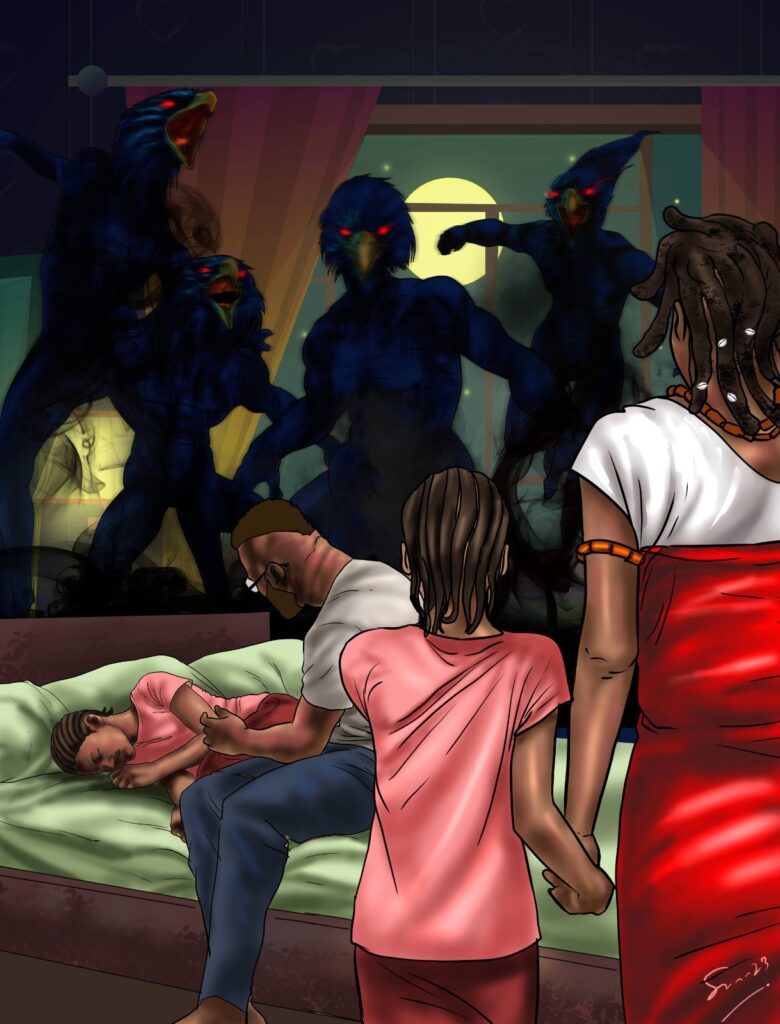You’ve been here before; this house with the black gate that has gold details and sharp spikes shooting up at the top. This house with the pink bougainvillaeas that have taken over the brick fence, so much that the cement barely peaks through. You know that the owners of the house have a pretty, white dog with a purple collar. You remember how amused you were that night when the tiny thing barked at you until a greying man clinging to a black robe came to shout at it.
“What are you barking at?!” the man had yelled before he switched on a torch and searched the premises. He couldn’t see anyone, so he hissed and picked up the dog, chastising it on his way to the door.
You are still looking at the gate when it opens, and the dog and the man emerge from behind it.
#
You never realized how rare it was to have dreams as vivid and controlled as yours until you saw a man on TikTok joke about the randomness of his. Curious, you began to ask your classmates what their dreams were like. It was an odd question, but the answers were amusing: being naked in school; kissing a crush; a lot of falling, too.
You learned about lucid dreaming during your computer time one Saturday night. So lost in articles about this seemingly special ability, you didn’t notice the minute hand slipping past your bedtime until your father’s hand struck your cheek so hard, causing a ringing in your ears that kept you up all night.
It is that sensation that you’re thinking about now, barely ten minutes left till your bedtime, as you read about what your internet search has taken you to: astral projection.
“Is this what you’re using your computer time to do!?” you hear, before your father’s hand collides with your face.
“This is the type of thing that killed your mother! These occultist acts! You want to join her abi?”
You want to ask him what he means, but between the stinging sensation on your cheeks, and the intensity of his voice as he continues to narrate the dangers of astral travel, you decide that it’s not the best time.
#
You can finally project again tonight because it is Friday and your father is at an all-night prayer meeting for the deacons. Aunty Lolade, his sister and your guardian for the night is a kinder version of him, so she lets you have two hours of computer time instead of one and laughs at your father’s instruction to make sure you’re not “roaming the spirit realm” in your sleep.
“How am I supposed to do that one abeg?” She says to you later, an amused smile on her face. “Will I come to your room and be shouting, ‘I hope your spirit is at home o!’?”
You remember the joke before you fall asleep and laugh.
“No, it is not,” you think to yourself.
When you finally fall asleep, you pull yourself out of your lucid dream, and into the astral plane, you are astonished by the weirdness of it; how the ground beneath you looks like shimmery water; how you sink into it to appear at a new location every time; how strange the beings are here, with faces and bodies that your human mind cannot comprehend. There are tails and horns and fish fins and fur and multiple hands and multiple eyes—all of varying colours. You are astonished.
What is even stranger, however, is that you can understand these beings: you do not know the language they speak and cannot compare it to anything you’ve ever heard on earth. But when you speak to them, and they respond, you know exactly what they’re saying.
You’re not going to be projecting into the physical realm anytime soon.
#
You meet your mother on your fourth trip. Your internet searches have already taught you that there are other beings in the astral realm. You know to avoid the entities that radiate negative energy. You know the ones that are approachable for help. You know that some of the humans here are not “awake” enough to be conscious of their presence here, so you no longer feel like they’re simply being arrogant when they ignore you. Honestly, you don’t care for the beings anyway. You’re simply here for the experience; to explore the cities that your human mind cannot fathom; to experience the fluidity of time and space, moving you from one destination to another in seconds. You’re here to escape your reality. Yet, here is your three years’ late mother; a woman who had taken her life with her own hands, leaving you in those of a man you both despised. A woman who you found red-eyed that early Sunday morning—when your father asked you to see why she was not yet ready for church—dangling from a rope tied to a hook in the ceiling, with her tongue protruding from her mouth, where saliva was starting to foam. When her paling body suddenly started to jerk, hope overwhelmed you with its promises, but reality wasn’t kind enough to allow you time to bring your mother down. Her body stopped.
It’s the jerking you remember when you see her; how it played in your mind; hour after hour; day after day; month after month; till gradually, it sank into the deepest, darkest parts of your brain, merely resurfacing to torment you at your lowest times. Next, you remembered the hollowness; the cruelty of it, how it banished you to extended periods of sleep to forget its presence, only to crawl back into you when you woke up and remembered your loss and began to cry until sleep found you again. You thought your father felt hollow too. He started drinking—something you never expected your overly righteous old man to indulge in — and muttered regularly about how your mother’s “demonic affiliations” were to blame. You found the accusation of invisible demons odd. Her only demonic affiliation was him.
#
The second time you meet your mother’s ghost it is almost magical. You find that you’re drawn to it—her. It’s as if you’re called by her. And it is a call you can’t resist; you don’t want to resist. She hugs you. You hug her as tightly as you can and wish you could cry; many emotions are swirling through you at this very moment.
“I’ve missed you so much my love,” she starts, but you can only nod a response.
You have so much to tell her about: the milestones she’s missed; the low moments when she wasn’t present to comfort you; the abuse that she wasn’t around to shield you from. But you do not talk about any of these things.
“Why did you do this to yourself?” you ask instead, and then start to question the appropriateness of the question as soon as it leaves your mouth.
She looks away from you first, and her body slides forward so that she’s holding her face in her palms.
“I didn’t want to burden you and your father,” she says after a dramatic sigh.
“Burden?” you ask, incredulous. “You were not a burden. If anything, the only burden in our family is still alive and well!”
“The doctor told me I had cancer,” she replies, and your eyes widen, but she doesn’t give you the chance to talk. “Pancreatic cancer. Late-stage. The longer we talked about my treatment, the more I realised that the financial burden of helping me get better would only put a strain on our family. God, the tests alone put a strain on me.”
“Why didn’t you tell anyone, mummy?” you question her, looking straight into her eyes. Many thoughts are dancing in your brain about the revelation, but this is the most important one. “Aunty Lolade, grandma, grandpa, your siblings, even daddy, they would have pulled funds together. They would have found a way.”
“And for what? Ask google about the life expectancy for late-stage cancer. Imagine asking my family to spend all that money, knowing full well that I wouldn’t be able to survive for more than a year? I had to consider these things.”
“But you couldn’t consider the effect that seeing you dangling from the ceiling would leave,” you mutter.
Suddenly, you are hit by a bit of realisation—maybe your mother was not aware of the gravity of her actions when she carried them out.
“I didn’t think it through,” she starts to explain, but you don’t want to hear it.
“You didn’t think about what seeing you in that state would do to us? You didn’t think about what daddy would become after seeing you go like that?”
“I know your father. And I know that if there’s one thing he despises in life, it’s having a financial load thrown at him out of nowhere. He would do the right thing and contribute to my treatment, but he’d despise me for it till I died, the whole time, complaining to anyone who’d listen, that it was my ‘demonic affiliations’ that made me so ill”. After which his anger would be the fact that he spent all that money, only for me to die in the end.”
“Despite everything you’ve said, I still can’t find the reason that you did it,” you tell her, but she continues like nobody said anything.
“It is exactly what happened after his mother died. You might not have been there to experience it, but I was.”
“So, leaving me with him was the only option?!” You ask. You don’t realise how angry her response makes you until you hear yourself.
“You left me with him!” You continue. “Did you consider what would happen to me?! Did you think about how much I’d miss you?! Did you—”
“It was rash, I can’t lie,” she interrupts you. “But I need you to know that it wasn’t my intention to leave you behind. I wasn’t thinking clearly, and I only did what I thought was best for you. I just didn’t have the resources or support to do it the right way and I’m sorry my love. I really am.”
Her voice breaks, and you feel bad for taking the conversation this way. But you have every right to be upset, you think. You’re stuck between missing your mother and detesting the fact she took herself from you.
“How did you learn this?” she asks, changing the topic. “Did you come here to see me? I can’t imagine your father would have allowed you to learn about astral travel.”
“He didn’t,” you say, and you laugh a little to yourself.
You tell her about how he caught you searching up projection on the internet and the hyper-vigilance of your sleep that followed. You tell her about how you started, about the dog that could see you even though his owner could not.
“I always knew I passed something down to you. Makes up for how much you resemble your father instead of me,” she says, laughing softly. You join in. You’ve missed laughing with your mother.
“He thinks it’s all evil,” you say.
“Oh. There’s definitely evil here. The funny part is, I already knew this before I came. But being here for so long—as the soul of a person that took their own life, it truly throws the evil at your face.”
“Is it different?” You ask. “For the people that didn’t commit suicide?”
“They go to heaven. Straight. Or hell,” she says, stretching a hand up then down for emphasis. “The rest of us? The universe doesn’t even give us the chance.”
She talks about the memories that followed her death; how she saw the other souls shoot up like fireworks, while she sank deeper, and deeper into the other planes. She talks about the weariness that hit her when she arrived, as if the place had wrapped her up in a cloak of unquenchable fatigue.
“I would give anything to have a body again. This place changes you. I’m not the mother you lost, my love. I am a destroyed version of her.”
“You’re not destroyed to me,” you try to comfort her, and place an arm around her waist. She only sighs.
“Sometimes,” she starts, “when it gets too lonely or I’ve had to fight off yet another lower vibrational being, I wish I had let your father do the work for me.”
#
“You need to stop coming here so often,” your mother solemnly advises you.
You don’t know how many visits you’ve made here since you first met her because you’ve stopped counting. You’ve figured out how to jump back into your body as soon as your father touches it, so it looks like you are merely asleep; another act your mother warned you about.

“You need to understand that it’s not good for your physical body to be left empty so often,” she continues. “And coming here too much will negatively affect your brain. Your reality is not here. It is on the physical plane. Constant visits will disrupt your perception—”
“Daddy is in the room,” you interrupt her.
“Let’s go,” she tells you, holding you tightly.
Within milliseconds, your body is in front of you. Your father is tapping you to wake up, but that is not what holds your attention.
There are three shadows in the room: dark entities with red eyes, a muscular human build, heads like birds and tails like lions. They turn to you and your mother as soon as you arrive. Your father cannot see them.
“Go to your body,” your mother starts to mumble to you. “I’ll try and keep them from it.”
You nod and proceed to the corner of the room as calmly as you can. In the centre of your room, your bed is already surrounded by figures, so it’s too early to approach it. You have no idea what they’re capable of. They look at you as you walk away from your mother. Red eyes glow ferociously as they follow your every move. You realise that you’re not shaking because you’re not in your body. The human body would quake at the sight of these entities. It would sweat, cry, and probably pee itself. It would run away too. You think about these things and you are wistful. A longing for the body that you’ve been leaving every night sets in. You crave the reality you’ve been running away from; a reality where you’d never have to face such beings. You are terrified.
Your father is oblivious to the scene unfolding in his presence. Frustrated with trying to wake you up, he leaves your body and returns to his room, promising to “deal with you” when he gets back.
Your mother runs to the bed, effectively distracting the beings, and you take the chance to enter your body. Your plan fails. A shadowy hand slaps you to the wall like you are nothing but an annoying insect. You collide with your pink, cloud-patterned wallpaper before your astral form touches the ground. It cannot feel pain. What it feels instead, is an overwhelming weakness. You are almost paralysed. It is up to your mother to save you now.
You can hear her fighting the beasts. You hear her voice: high pitched and fragile, against the deep, mumbled grunts of the beasts, and you worry that her weakened form is not strong enough to fight them all off. A feeling of defeat starts to set in. It is further intensified by the absolute silence that engulfs the room, and the sharp, tugging sensation that climbs your astral form. Your body has been occupied.
You’ve read about beings like this. How they roam the earth, looking to occupy the bodies of the ones who have travelled to the astral realm. You have never read about how these bodies are recovered.
You want to mourn your loss. You want to scream. To wail and roll on the floor. But you cannot move. Instead, your mother’s advice rings in your mind, calling you a fool in the way that only a mother’s “I told you so” can. Now, you will be able to live with her for eternity. To see your mother again. This is what you wanted, isn’t it?
“Mummy,” you struggle to word out.
You have no idea where she is, but you can only hope that the last of her strength has not been knocked out of her.
At the sound of your voice, the beasts march to the corner of the room where your astral form lies, one after the other, until all three of them are looking down at you.
“Three. Three?” you wonder to yourself.
They proceed to pick you up.
“Wait,” you hear your voice.
Your body glides towards you. There is something familiar about the rhythm of the footsteps that you hear, but you don’t want to accept the realisation that is sneaking up on you.
“My darling,” it starts.
“I can’t believe you did this!” you try to yell, but it comes out like a loud whisper. “Why did you do this?!”
“I told you. I am not the mother you lost.”

